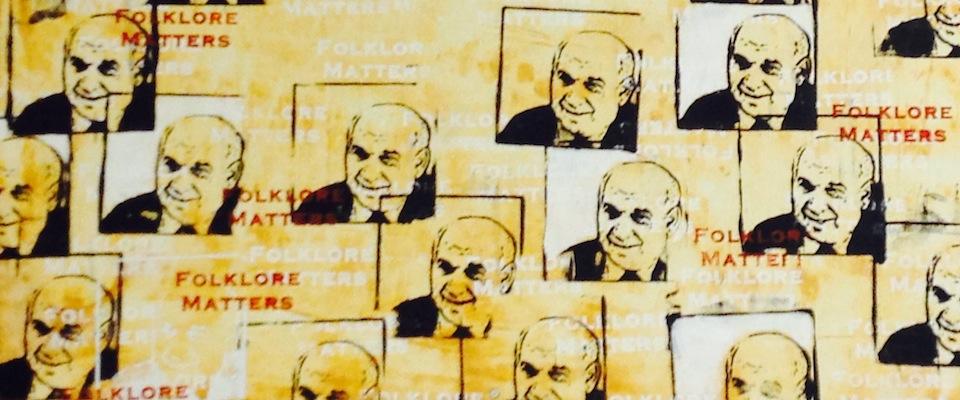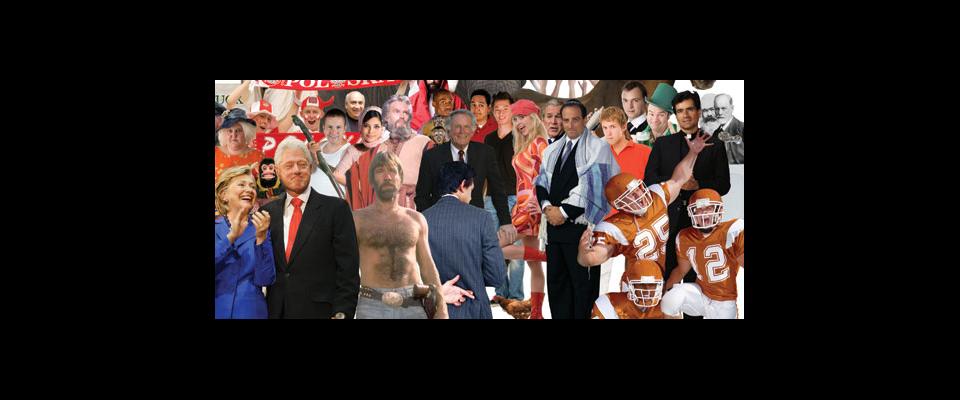What do a light bulb joke, your great aunt’s cold remedy, and a poem scribbled on the door of a bathroom stall have in common? If you know the answer, you may have taken a class from the late UC Berkeley professor Alan Dundes. Each of these, Dundes would have said, is an example of folklore—a category of knowledge that many people associate with the legends, old-wives tales and superstitions passed along by preliterate societies in the times of yore.
But Dundes taught that folklore, rather than being an erudite study of ancient ways, was alive, it was relevant, and it was everywhere. It was the jokes people told, the stories they shared, even the graffiti they wrote on walls. Every person, Dundes believed, was a walking treasure trove of folk wisdom.
“The folk may have more insight into the nature of human behavior,” he wrote, “than do the most learned scholars of the academy.”
On Thursday evening, a ceremony in Doe Library will mark the opening of Dundes’ papers—45 cartons of correspondence and professional memoranda housed in the Bancroft Library.
The professor, who died in 2005, arguably did more to influence modern folklore scholarship than anyone of his generation. Incisive, irreverent and often controversial, he applied his Freudian psychoanalytic approach to topics ranging from tongue twisters to ethnic slurs, from holy texts to football.

Folklore inhabits a strange place in academia. As the study of the “unofficial knowledge” people learn informally from one another (in contrast to knowledge gained from scholarly texts), it is sometimes belittled as something less than a science. Some argue that folklore presents a challenge to the monopoly on knowledge held dear by elite academia, because the “folk,” rather than academics, are its gatekeepers.
Born in 1934, Dundes developed a fascination for folklore at the family dinner table, listening to his father, a lawyer who commuted to New York City, recount the jokes and stories he’d heard told on the train ride home. His parents also inspired in him a love of books; according to one account, they paid him one dollar for every hundred books he read.
He attended Yale and, while earning a master’s in teaching in English, he met his future wife Carolyn, a graduate student at Yale Drama School. He also discovered by chance a field he previously had not known existed: folklore. He went on to earn a Ph.D. in folklore at Indiana University, and joined the anthropology department at UC Berkeley, becoming a full professor within five years, in 1968.
From the beginning, he challenged the establishment. In an early paper, he contested the notion, commonly accepted at the time, that the “folk” in folklore referred only to illiterate rural peasants. He offered his own definition as any group of two or more people who share a common linking factor. By his definition, we were all folk, and thus open game for folkloric study.
Dundes explored genres from across the folklore spectrum: not only traditional proverbs, fairy tales, and riddles, but also contemporary and novel genres like tongue twisters, Xerox lore, and even bathroom graffiti, for which he coined the term “latrinalia” (He preferred it to “shithouse poetry” because, he argued, not all bathroom graffiti was in verse). He published papers at a breakneck pace, impressing his colleagues with the thoroughness of his research.
“He was a walking bibliography,” says former colleague and Cal anthropology professor Daniel Melia.
Dundes believed that folklore was like a mirror of our values, says his daughter, Alison Dundes Renteln, a professor of political science and anthropology at the University of Southern California. “He was all about having people take a serious look at what their culture was involved in, even if some of it was unpleasant.”
“As a psychoanalytic folklorist,” he once wrote, “my professional goals are to make sense of nonsense, find a rationale for the irrational and seek to make the unconscious conscious.”
His Freudian approach sometimes elicited criticism and controversy. A speech he gave to the American Folklore Society on scatological aspects of the German national character was censored. Then there was “Into the Endzone for a Touchdown,” a paper exploring the homoerotic underpinnings of American football, for which he received death threats.
“He was the last Freudian after Freud,” says Melia, laughing. “And he offered very clever Freudian insights, but at times his analysis could be kind of reductionist. Though quite often he was right.”
Physically large, Dundes had an outsized personality to match.
“When he was in the office, you knew it,” says friend and former colleague Stanley Brandes. “There was tremendous activity around him. There were always people waiting in the hall outside his office, milling around. You could hear his voice and his laughter booming through the building.”
“He was the funniest person I ever met in my life,” says Brandes. “He could have been a standup comic and made a fortune.”
Though his comedic talents were the stuff of—well—lore, Dundes’ interest in humor had a serious side.
“Yes, he studied jokes, but he studied them to show that jokes are serious,” says Tok Thompson, the last Ph.D. candidate to study under Dundes. “Humor can reveal a great deal about our culture.”
For example, in an essay entitled “From Jock to Joke: The Sic Transit of O.J. Simpson,” Dundes explored the psychology behind “gallows humor” and the joke cycles that often follow celebrity scandals, natural catastrophes, and national or international disasters. He compared such jokes to whistling in the dark: “It doesn’t exactly flood the area in light,” he wrote, “but it does make the scene somewhat less frightening.”
The “joke professor,” as Dundes was sometimes called, attracted large numbers of undergraduates to his seminars. Thompson would often attend these classes, just to witness his mentor in action. At the end of his lectures, Thompson recalls, the more than 400 students would often erupt in spontaneous standing ovations, something Thompson had never witnessed before—and hasn’t since.
Thompson credits Dundes with inspiring his career: He is now an associate professor of anthropology at USC where, among other subjects, he teaches a class on ghost stories.

To further instill in his students that folklore was a living, breathing subject, Dundes established the UC Berkeley Folklore Archive, a repository for items of folklore. Each semester he tasked his undergraduate students with collecting folkloric materials for the archive. Initially just an overflowing filing cabinet in his office, the archive is now housed in a small room Kroeber Hall, jam-packed with over 500,000 items of folklore from around the world. Each item includes a short analysis by the collector and is carefully catalogued according to genre. Among the numerous categories there is even a file for “Dundenesiana,” or folklore related to Dundes himself. One item in the file, found scrawled on a bathroom wall reads, “Keep Alan Dundes working! Write graffiti!”
He was able to make his students understand their own folk knowledge, says Thompson, “and make them realize that they had all this tremendously important information in their heads.”
That Dundes had a huge impact on many of his students is undeniable. An oft-told example: One day Dundes received an anonymous donation to the folklore department from one of his former students. He and his wife initially thought the check was for $1,000, before discovering to their shock that they had overlooked a few vital zeroes. The donation was for $1 million.
Dundes used the million to endow a distinguished professorship in folklore at Berkeley, where he had already helped establish a folklore masters program.
He published more than 250 papers and authored, co-authored, and edited upwards of 35 books over a 40-year career. He collaborated with folklorists around the world, was president of the American Folklore Society and was the first folklorist elected to the American Academy of Arts and Sciences. In 1993 he won the Pitrè Prize for lifetime achievement in folklore.
On March 30, 2005, Dundes collapsed while giving a lecture on the Marxist interpretation of folklore, felled by a fatal heart attack while doing what he loved most.
“He didn’t want a memorial,” says his son, David Dundes. “He felt his scholarship was his legacy.”





















